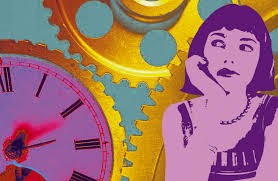Why do we dream?
 Sigmund Freud the father of psychology said that mind is landscaped. Like a landscape, mind has a structure and each structure has function of its own to play. In Freud’s model of mind the conscious mind (everything that we see and are aware of) is seen as the tip of the iceberg of our unconscious mind. Our unconscious mind is like a storehouse of our primitive wishes, ideas, and impulse which are kept at bay and mediated by the preconscious area. According to Freud the structure of the unconscious mind is like a large metal pot ‘cauldron’. So all that we desire but are scared to speak of and some events which have left lasting effect on us of which we are unable to speak because of fright are locked away in the unconscious mind. The ‘locking away’ process happens through suppression/repression. Sigmund Freud emphasized the importance of the unconscious mind; he stated that to a great extent it governs behavior of people. And, the objective of psychoanalysis is to make the unconscious conscious (aware).
Sigmund Freud the father of psychology said that mind is landscaped. Like a landscape, mind has a structure and each structure has function of its own to play. In Freud’s model of mind the conscious mind (everything that we see and are aware of) is seen as the tip of the iceberg of our unconscious mind. Our unconscious mind is like a storehouse of our primitive wishes, ideas, and impulse which are kept at bay and mediated by the preconscious area. According to Freud the structure of the unconscious mind is like a large metal pot ‘cauldron’. So all that we desire but are scared to speak of and some events which have left lasting effect on us of which we are unable to speak because of fright are locked away in the unconscious mind. The ‘locking away’ process happens through suppression/repression. Sigmund Freud emphasized the importance of the unconscious mind; he stated that to a great extent it governs behavior of people. And, the objective of psychoanalysis is to make the unconscious conscious (aware).
In 1923, Freud developed a more structural model of the mind comprising of id, ego and superego. These are not physical areas within the brain, but rather hypothetical conceptualizations of important mental functions.
Freud said that the id expresses pleasures which comprises of two kinds of biological instincts or drives which Freud labeled as Eros and Thanatos. Eros helps the individual to survive; it expresses life-sustaining activities such as respiration, eating and sex. The energy created by the life instincts is known as libido. In contrast, Thanatos is viewed as a set of destructive forces present in all human beings such as hostility, aggression and destruction. Freud believed that Eros is stronger than Thanatos, thus enabling people to survive rather than self-destruct.
The ego develops from the id during infancy. The ego’s goal is to satisfy the demands of the id in a safe manner which is socially accepted and does not harm others. In contrast to the id the ego follows the reality principle as it operates from both the conscious and unconscious mind.
The superego develops during early childhood when the child identifies with the same sex parent and is responsible for setting moral standards to be followed. The superego operates on the ethics and morality principle and motivates us to behave socially in a responsible and acceptable manner. The superego makes us self-governed; we feel ashamed for cheating others or harming others and feel guilty if rules are not followed by us. When there is conflict between the objectives of the id and superego the ego acts as a referee and arbitrates the conflict. The ego can thus organize various defense mechanisms to prevent it from becoming overwhelmed by anxiety.
Freud has explained that our brain guards us from disturbing thoughts and memories by holding back them and he believed that we are almost entirely driven by unconscious sexual desire. So Freud used to say that our dreams are a secret outlet for these repressed desires. Sigmund Freud used dream analysis to interpret the fundamental language of dreams; it is very different from normal conscious thinking. Freud intelligently used id, ego and super-ego to support his research on dreams.
The study of dreaming is called Oneirology; its psychoanalysis runs through neuroscience, psychology, and literature. Do you know, till today the plain fact why we dream is still unexplained. But that hasn’t stopped scientists from coming up with some pretty fascinating premise; each study has come out with variety of reasoning.
 Dreaming allows wish fulfillment: After examining and analyzing dreams of hundreds of his patients, Freud came up with a presumption that dreams are wish-fulfillments. Any dream, no matter how terrifying, can be looked at as a way of getting something that you want, either literally or symbolically. If you dream of falling from height, which is the most common dream, the dream suggests that you may have lost control over a particular situation in your life. The situation can possibly be linked to job, work, and school assignment, home or even in your relationship. Falling dreams are usually vivid ones that you can recall them quite easily and are able to remember most of the symbols.
Dreaming allows wish fulfillment: After examining and analyzing dreams of hundreds of his patients, Freud came up with a presumption that dreams are wish-fulfillments. Any dream, no matter how terrifying, can be looked at as a way of getting something that you want, either literally or symbolically. If you dream of falling from height, which is the most common dream, the dream suggests that you may have lost control over a particular situation in your life. The situation can possibly be linked to job, work, and school assignment, home or even in your relationship. Falling dreams are usually vivid ones that you can recall them quite easily and are able to remember most of the symbols.
Dreaming is storing an idea in memory: Famous psychiatrist Jie Zhang said that dreams are not just randomly-generated stories caused by neural impulses. Perhaps, there are also more reasons for dreaming them. He said that our brain is always storing memories regardless of whether we are awake or asleep. Dreams are a kind of “temporary storage” area of realization, a spot where we hold memories before we move them from short-term to long-term storage. A dream flashes through our mind before it is filed in our memory.
Dream often cleanses our mind: In our dreams we get rid of undesirable connections and associations that build up in our brains throughout the day. Basically, dreams are garbage collection mechanisms, clearing our minds of useless thoughts and making way for better ones. Essentially, we dream in order to forget the bad actions and deeds. Dreams help us get rid of the information overload of daily life and retain only the most important data. Yes, that’s the truth.
 Strengthening what we learn: One theory suggests that we actually dream to remember rather than forget. It’s based on a number of studies that show people remember what they’ve learned better if they dream after learning it. It supports Jie Zhang’s theory about long-term memory storage; our dreams help us retain what we’ve learned.
Strengthening what we learn: One theory suggests that we actually dream to remember rather than forget. It’s based on a number of studies that show people remember what they’ve learned better if they dream after learning it. It supports Jie Zhang’s theory about long-term memory storage; our dreams help us retain what we’ve learned.
Psychiatrists suggest that we should keep people awake and talk to them for hours if they have experienced a trauma. The theory is reinforced by recent studies on trauma, which suggest that when people go to sleep right after a traumatic experience, they are more likely to remember and be haunted by the trauma.
Preparation for threats: Neuroscientist Antti Revonusuo of Finland suggested that dreams play a biological function often to replicate threatening events which prepare us to face it. People who have threatening kinds of dreams are better able to face threats in their waking hours, because they’ve already run through these in their dreams. Harvard medical researcher Deirdre Barrett suggests that dreams are a kind of theatre in which we are able to solve problems more effectively than when we are awake. This happens partly because the dreaming mind makes connections more quickly than the waking mind does. This idea is based in part on experiments she did where people were asked to solve problems while “sleeping on them.” The problem-solving outcomes were better for the candidates who dreamt.
 Processing painful emotions with symbolic associations: solving problems in our sleep is itself a kind of Darwinian process. Basically, dreams are natural selection for ideas and this can broaden to the level of emotions, too. One group of researchers suggests that dreams are places where we run through situations and try to select the most useful emotional reactions to them. Psychologist Richart Coutts suggests that this is the best way to react to those situations emotionally. And, we often feel better about painful issues the next morning after a night of dreams. While a Darwinian model of dreaming suggests that we aggressively transform our ideas to weed out problematic and awkward emotions, a new model of dreaming suggests that the process is more like therapy. We don’t aggressively select for the most adaptive idea or emotion, we just run through those ideas and emotions and place them in a broader psychological context. Often, the brain does this by associating an emotion with a symbol.
Processing painful emotions with symbolic associations: solving problems in our sleep is itself a kind of Darwinian process. Basically, dreams are natural selection for ideas and this can broaden to the level of emotions, too. One group of researchers suggests that dreams are places where we run through situations and try to select the most useful emotional reactions to them. Psychologist Richart Coutts suggests that this is the best way to react to those situations emotionally. And, we often feel better about painful issues the next morning after a night of dreams. While a Darwinian model of dreaming suggests that we aggressively transform our ideas to weed out problematic and awkward emotions, a new model of dreaming suggests that the process is more like therapy. We don’t aggressively select for the most adaptive idea or emotion, we just run through those ideas and emotions and place them in a broader psychological context. Often, the brain does this by associating an emotion with a symbol.
 So friends, dreams play an important role in our emotional, psychological and physical health. We have the romantic, terrifying, emotional, funny, awkward, loving, uniting, separating and weird dreams. What we may not realize is that these dreams are common across cultures and their seemingly wacky content is both important and meaningful. We spend an average of eight hours a night sleeping, which is basically a third of our life. About a quarter of our sleep is spent dreaming, which in an average lifetime represents about six full years of dreaming. Most of the researchers conclude that dreams play a central role in our emotional health, our memory, our learning and to help us to find solutions to our problems.
So friends, dreams play an important role in our emotional, psychological and physical health. We have the romantic, terrifying, emotional, funny, awkward, loving, uniting, separating and weird dreams. What we may not realize is that these dreams are common across cultures and their seemingly wacky content is both important and meaningful. We spend an average of eight hours a night sleeping, which is basically a third of our life. About a quarter of our sleep is spent dreaming, which in an average lifetime represents about six full years of dreaming. Most of the researchers conclude that dreams play a central role in our emotional health, our memory, our learning and to help us to find solutions to our problems.














































